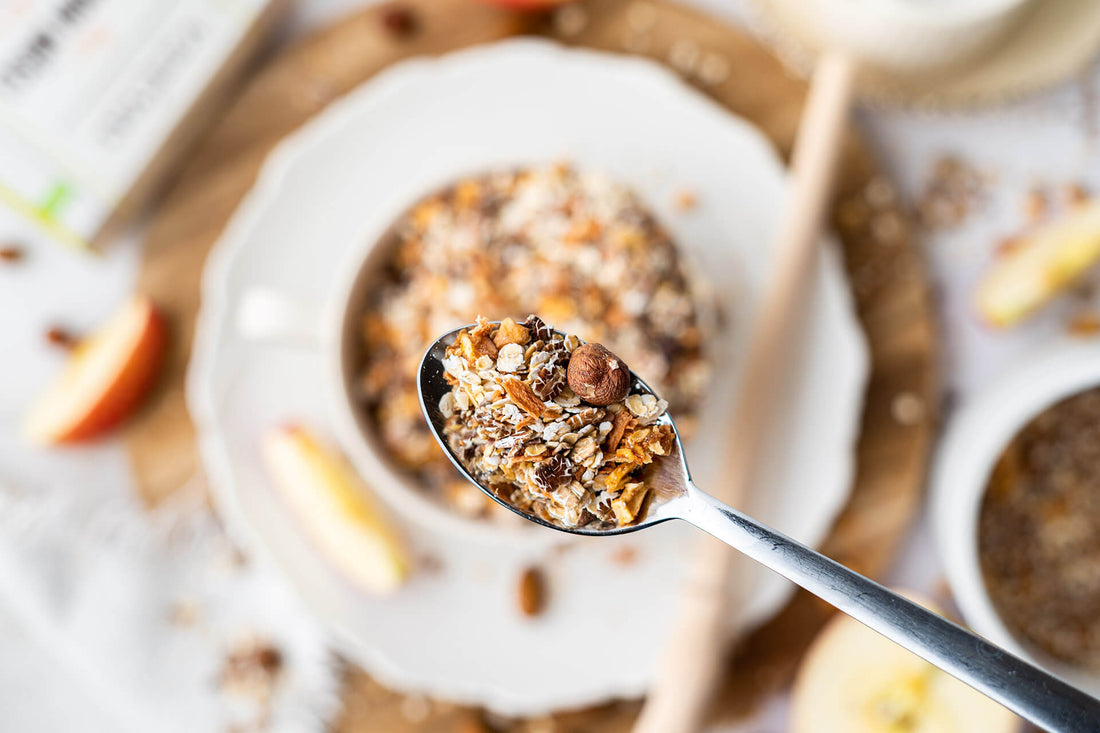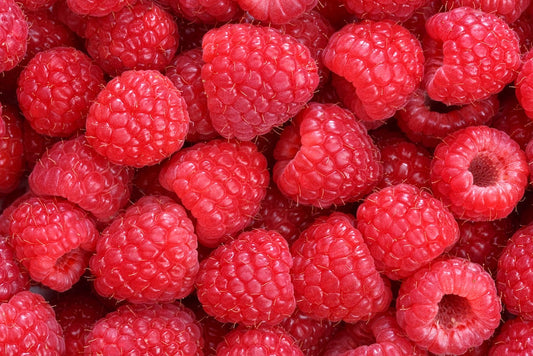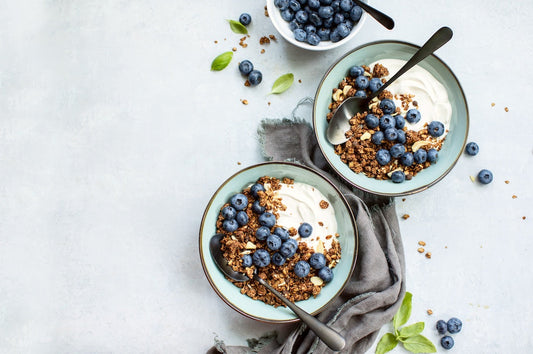Nuts, also known as nut fruits, are indehiscent fruits. This means that the seed of the plant is separated by the pericarp (fruit wall).
For us humans, nuts are an excellent source of nutrients.
They not only provide us with healthy fatty acids, but also plenty of vitamins, minerals and trace elements.
They should therefore be part of every diet and healthy nutrition. Nuts contribute to your health.
Nevertheless, many people consider them to be calorie bombs and avoid them in their diet or as a snack in order to cut down on calories.
In this article, we will explain why this is not a good idea and why it is actually worth covering part of your daily requirement with nuts.
We will also show you how you can easily add nuts to your healthy breakfast in the morning or your salad in the evening.
They provide you with lasting energy and a pleasant feeling of satiety.
More about the nutrients in nuts
Why are nuts so healthy?
The reason why nuts should not be avoided at all is quite simple.
Nuts, such as peanuts, real walnuts, common hazelnuts, cashews or pine nuts, are full of healthy nutrients.
A nut mix not only contains plenty of healthy fats and proteins, but also a variety of important vitamins and minerals, such as magnesium.
| Calories | 607 calories |
| Fat content | 54 g |
| – saturated fatty acids | 9 g |
| – polyunsaturated fatty acids | 15 g |
| – monounsaturated fatty acids | 28 g |
| – trans fatty acids | 0.1g |
| Cholesterol | 0 mg |
| Sodium | 273 mg |
| Potassium | 632 mg |
| Carbohydrates | 21 g |
| – Fiber | 7 g |
| – Sugar | 4.2g |
| Protein in nuts | 20 g |
| – Calcium | 117 mg |
| – Iron | 2.6 mg |
| – Vitamin B6 | 0.4 mg |
| – Magnesium | 229 mg |
This means that they not only ensure excellent brain performance, but also contribute to a healthy cardiovascular system and a strong immune system.
Nuts contain these nutrients
So, we now know that nuts are very healthy due to the wide range of nutrients they contain.
We will now explain which nutrients these are and what role they play in your body.
Healthy fats from nuts
Nuts contain a lot of fat. This may not sound particularly positive, but if you take a closer look, it looks quite different.
This is because nuts are particularly high in healthy, unsaturated fatty acids.
These include, among others, omega-3 fatty acids, which not only protect the body against harmful free radicals but also reduce the risk of cardiovascular disease.
Nuts as a source of plant-based protein
Nuts are an excellent source of protein and thus play an important role in maintaining and building our muscles.
It is no coincidence that nuts and nut mixes are a very popular snack among athletes.
For some time now, peanut butter has also been one of the favourite products of athletes.
Nuts are high in fibre
The high fibre content, on the other hand, supports our gastrointestinal tract and ensures stable blood sugar levels.
In addition, foods that are rich in fibre keep you feeling fuller for longer, thereby preventing you from reaching for unhealthy snacks in between meals.
Nuts as a source of vitamins
Nuts also provide plenty of vitamins. In particular, they are an excellent source of B vitamins and vitamin E.
While B vitamins activate the metabolism and play a crucial role in blood formation, vitamin E has an antioxidant effect and protects the body from harmful molecules.
Furthermore, it has an anti-inflammatory effect and supports the immune system, the nervous system and the skeletal muscles.
Nuts contain many minerals
Nuts are an excellent source of essential minerals. For example, calcium and magnesium ensure healthy bones and teeth.
Iodine, on the other hand, ensures that the thyroid gland functions optimally, as it plays a crucial role in the formation of thyroid hormones.
Nuts also contain copper and manganese – while manganese is an important component of various enzymes, copper plays a crucial role in blood formation and thus influences our immune system.
Other important trace elements such as zinc, selenium and iron are also provided by eating nuts.
These minerals not only ensure that metabolic processes run smoothly, but also help the body to fight free radicals, thus protecting against cell damage.
Why nuts are good for the brain
In particular, the trace elements contained in nuts (zinc, iron, magnesium, etc.) have a positive influence on brain activity.
Magnesium, for example, is crucial for the provision of energy in the brain and also protects the nervous system from stress.
The building blocks of proteins, amino acids, are an essential component of important neurotransmitters and thus, when present in sufficient quantities, ensure improved thinking ability and have a positive effect on the psyche and mood.
B vitamins and vitamin E are good for the nerves and protect the brain from calcification, among other things.
Since nuts are excellent sources of healthy fats – and these in turn are an important component of nerve cells – they ensure optimal structure and functionality of the brain.
The high lecithin content also has a positive effect on our brain – the active ingredient contained in it strengthens our brain and nerve cells and, among other things, increases our ability to concentrate.
The most important nut varieties at a glance
You probably already know most of the nuts – but to give you a good overview, we would like to briefly discuss the most important types of nuts and their nutritional values and highlight their special features.
Walnuts
Walnuts are an especially good source of unsaturated fatty acids and thus contribute to a healthy cardiovascular system.
They also contain plenty of vitamin B6 and zinc. That's why walnuts are considered a superfood for your brain, as they help you to concentrate and strengthen your immune system.
Walnuts are a superfood for your brain.
Hazelnuts
Hazelnuts are particularly high in fat and contain plenty of vitamins. In particular, they contain high levels of vitamins B7 and E.
The effect of vitamin B7 on the body:
- improved hair growth
- boosts metabolic processes
- has a positive effect on the nervous system
In addition, vitamin E in hazelnuts has an antioxidant effect that helps to maintain a healthy immune system. The content of copper and manganese, which is particularly high in this type of nut, should also be emphasised.
7 reasons why hazelnuts are so healthy
Peanuts
Although peanuts are actually legumes, we don't want to leave them out.
Peanuts are considered to be the most protein-rich type of nut and are therefore particularly popular with athletes.
Peanuts are also high in fibre and contain many vitamins. Particularly striking is their high vitamin B3 content, which is of great importance for energy metabolism and the regeneration of the body.
The amount of minerals and trace elements such as magnesium, copper and zinc is also not negligible.
Homemade peanut butter without sugar – recipe
Cashew nuts
The healthy cashew nut contains less fat than other types of nuts, but has a higher carbohydrate content.
It not only provides plenty of magnesium and phosphorus, but also a large amount of copper. This trace element is particularly important for the optimal functioning of the nervous system.
9 reasons why the cashew nut is so healthy
Brazil nuts
Brazil nuts are not only particularly rich in minerals (selenium, copper and phosphorus), but also provide plenty of vitamin B1.
B vitamins play a crucial role in carbohydrate metabolism and thus influence our nervous system, brain and muscle function.
However, since the fat content is very high, Brazil nuts should only be consumed in small quantities.
Almonds
Almonds are particularly rich in protein and fibre. Not only is their vitamin E content worth highlighting, but the amount of trace elements and minerals should not be neglected either.
6 reasons why almonds are healthy
Pistachios
Pistachios contain plenty of vitamins, minerals and trace elements, which not only strengthen your immune system but also contribute to a healthy cardiovascular system.
Pecans
Due to their high fat content, pecans are among the nuts with the highest calorie content. Therefore, you should only eat them in small quantities.
Nevertheless, it is advisable to incorporate them into your diet in a targeted way, as pecans contain many unsaturated fatty acids and thus contribute to a healthy cardiovascular system.
They also contain plenty of vitamin B1 and B7, as well as exceptionally high levels of copper, manganese and zinc.
Macadamia
The macadamia nut consists of almost 75 per cent fat, more than any other nut. Therefore, it should only be consumed in small quantities.
Nevertheless, it is worth eating at least a small amount, as it consists mainly (almost 80%) of unsaturated fatty acids.
These have a positive effect on cholesterol levels and thus have a positive influence on the cardiovascular system.
It is difficult to say which nut variety is the healthiest for you, as each variety offers its own advantages. It is best to mix nuts to get the benefits of all varieties.
Do nuts help you lose weight?
Despite their high fat content and reputation as a calorie bomb, nuts should not be avoided in the diet – because contrary to these prejudices, they can even support weight loss.
Some studies 1, for example, indicate that the targeted consumption of nuts can help you lose weight.
According to these studies, walnuts, for example, are said to change the way our brain perceives food.
So a daily portion of walnuts could help us to reduce our appetite for fatty foods and thus make losing weight easier.
What's more, nuts can help to stabilise blood sugar levels naturally, thus preventing those dreaded hunger pangs.
In addition, the high fat, protein and fibre content ensures a long-lasting feeling of satiety.
Despite these positive properties, it is important to incorporate nuts into your diet in a targeted and measured way so as not to consume too many calories.
Ideally, you should eat about a handful of nuts at a time – it's best to vary the types of nuts you eat regularly to get all the nutrients you need.
Nuts as a topping for your breakfast – delicious and healthy
An easy way to incorporate your daily nut ration into your diet is to top your favourite muesli or porridge with nuts.
Because nuts as a topping for porridges or smoothie bowls not only provide a unique taste and a crunchy bite, but also supply you with important nutrients.
This makes them the perfect companion for your breakfast and an energy-rich start to the day.
Discover Verival Organic Porridge
But nuts are not only good in your breakfast bowl, they can be used in many different ways. How about a homemade hazelnut cream, for example?
The recipe is not only super simple and quick to make, but, unlike nut nougat spreads from the supermarket, it has the advantage that you know exactly what's in it:
- Freisling H, Noh H, Slimani N, et al. Nut intake and 5-year changes in body weight and obesity risk in adults: results from the EPIC-PANACEA study. Eur J Nutr . Published online July 21, 2017:2399-2408. doi: 10.1007/s00394-017-1513-0
























